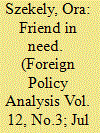| Srl | Item |
| 1 |
ID:
146348


|
|
|
|
|
| Summary/Abstract |
When a regional sponsor of militant movements experiences profound domestic instability, what happens to its clients? This paper explores this question by examining the case of Syria and its clients using a principal–agent approach. It examines three types of principal—single, collective, and multiple—focusing on the varying effects that these relationships have on the agents involved and arguing that each type of principal presents prospective agents with a trade-off between a loss of autonomy and a loss of internal cohesion. By comparing the effects of Syrian sponsorship on nonstate actors who have served as Syrian agents at various points in the evolution of the regime, I demonstrate that each type of principal has distinct advantages and risks for its agents. The paper concludes by outlining five possible outcomes of the current uprising in Syria for the Asad regime's clients, based on the uprising's impact on the regime as a principal.
|
|
|
|
|
|
|
|
|
|
|
|
|
|
|
|
| 2 |
ID:
156549


|
|
|
|
|
| Summary/Abstract |
Under which conditions are principals able to regain control when agency slack has occured? While existing research highlights a number of important factors related to the conditions under which agents engage in slack, scholars have to a less extent investigated which causal mechanisms affect the ability of states to regain control of their errant agents. Extending the principal–agent literature, this contribution argues that the ability of principals to regain control of their agents depends on three causal mechanisms: the type of monitoring mechanisms; the extent of fragmentation within an international organization; and the credibility of sanctions available to member states. To illustrate this argument, I compare two cases of agency slack: at the European Commission during the Eurozone crisis in 2015; and at the World Health Organization in the 1990s. The findings suggest that regaining control of runaway agents after slack has occurred is easier when there is a low level of fragmentation within an organization and states have centralized monitoring mechanisms and credible sanction mechanisms, such as budgetary contractions, at their disposal.
|
|
|
|
|
|
|
|
|
|
|
|
|
|
|
|